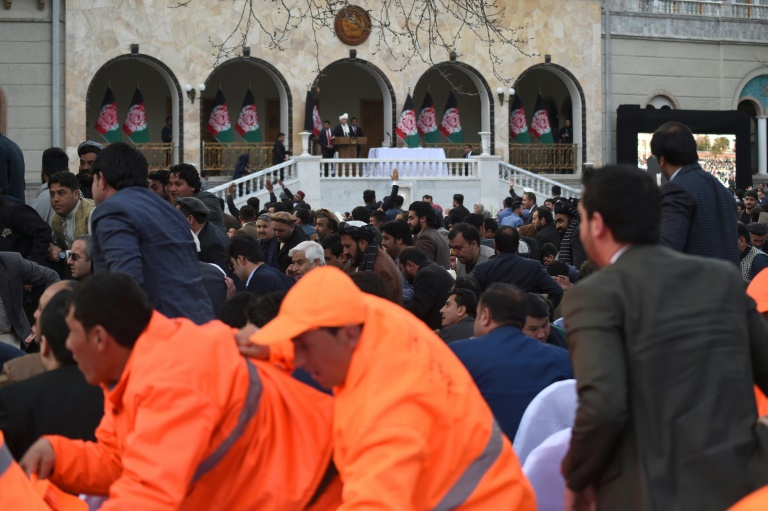
Officials and guests react after hearing loud blasts during Afghan President Ashraf Ghani's inauguration ceremony, but he refused to leave the podium in Kabul, Afghanistan, March 9, 2020. /AFP
Officials and guests react after hearing loud blasts during Afghan President Ashraf Ghani's inauguration ceremony, but he refused to leave the podium in Kabul, Afghanistan, March 9, 2020. /AFP
The United States opposes any efforts to create a parallel government in Afghanistan, U.S. Secretary of State Mike Pompeo said on Monday, hours after the country's president and his main election rival held the parallel inauguration ceremonies.
"We strongly oppose any action to establish a parallel government, and any use of force to resolve political differences," Pompeo said in a statement.
In Afghanistan's previous election in 2014, the U.S. brokered a power-sharing deal between Ashraf Ghani and Abdullah Abdullah as president and chief executive, respectively.
Ghani was sworn in for a second term on Monday, in a ceremony attended by U.S. Special Envoy Zalmay Khalilzad and other international representatives, including NATO forces commander Scott Miller.
His political rival Abdullah, who contested the election results, held a parallel inauguration ceremony of his own, escalating the feud between the arch rivals and casting a shadow over the commencement of intra-Afghan peace efforts.
Meanwhile, the U.S. has started withdrawing troops as part if its deal with Taliban. Sonny Leggett, a spokesman for the U.S. forces in Afghanistan, said on Monday that U.S. forces had begun conditions-based reduction of forces to 8,600 over 135 days.
"U.S. Forces for Afghanistan maintains all the military means and authorities to accomplish our objectives, including conducting counter-terrorism operations [...] and providing support to the Afghan National Defense and security forces," Leggett said.

A man rests on chairs ahead of the start of Afghanistan President Ashraf Ghani's inauguration ceremony, Kabul, Afghanistan, March 9, 2020. /AFP
A man rests on chairs ahead of the start of Afghanistan President Ashraf Ghani's inauguration ceremony, Kabul, Afghanistan, March 9, 2020. /AFP
On Monday, Afghan President Ghani will reportedly issue a decree for at least 1,000 Taliban prisoners to be released this week, paving the way for opening direct talks between the Afghan government and the Taliban insurgents.
Ghani had previously rejected the demand as a condition for talks, but five official sources said Ghani agreed to release the prisoners in order to secure the U.S. and other international endorsements for his inauguration as president.
"This is the 'price' that Ghani had to pay in return for Khalilzad attending his inauguration," a former senior Afghan official told Reuters.
Three of the sources said Ghani would announce on Tuesday he was releasing around 1,000 prisoners, with the elderly and those nearing the end of their sentences prioritized.
Talks that both camps carried out with Khalilzad over the day and the weekend before failed to forge a deal that would prevent rival swearing-in events, official sources said.
A prisoner release is part of an agreement between the U.S. and the Taliban that allows U.S. forces and NATO troops to withdraw from Afghanistan and end more than 18 years of war.
The Taliban's demand for the release of 5,000 prisoners as a confidence-building measure has been the most contentious part of the U.S.-Taliban deal signed in February. Ghani, earlier in March, rejected the demand, saying the Afghan government made no such commitment.
After being sworn, Ghani said in a speech that he would issue an order on Tuesday about the 5,000 Taliban prisoners the militant group has demanded be released in order to begin talks with the Afghan government.
A senior Afghan security official said Ghani will release Taliban prisoners who are above the age of 52 to prove that he is willing to start talks with the Taliban.
"Young Taliban prisoners will not be released at this stage; the (release) numbers may vary between 1,000 to 1,800," said a senior Afghan security official.
Read more:
Could Afghanistan finally be on the road to peace?
U.S. and Taliban announce deal to reduce violence in Afghanistan
Afghanistan's quagmire, political rivalry and a tenuous peace deal
(With input from agencies)